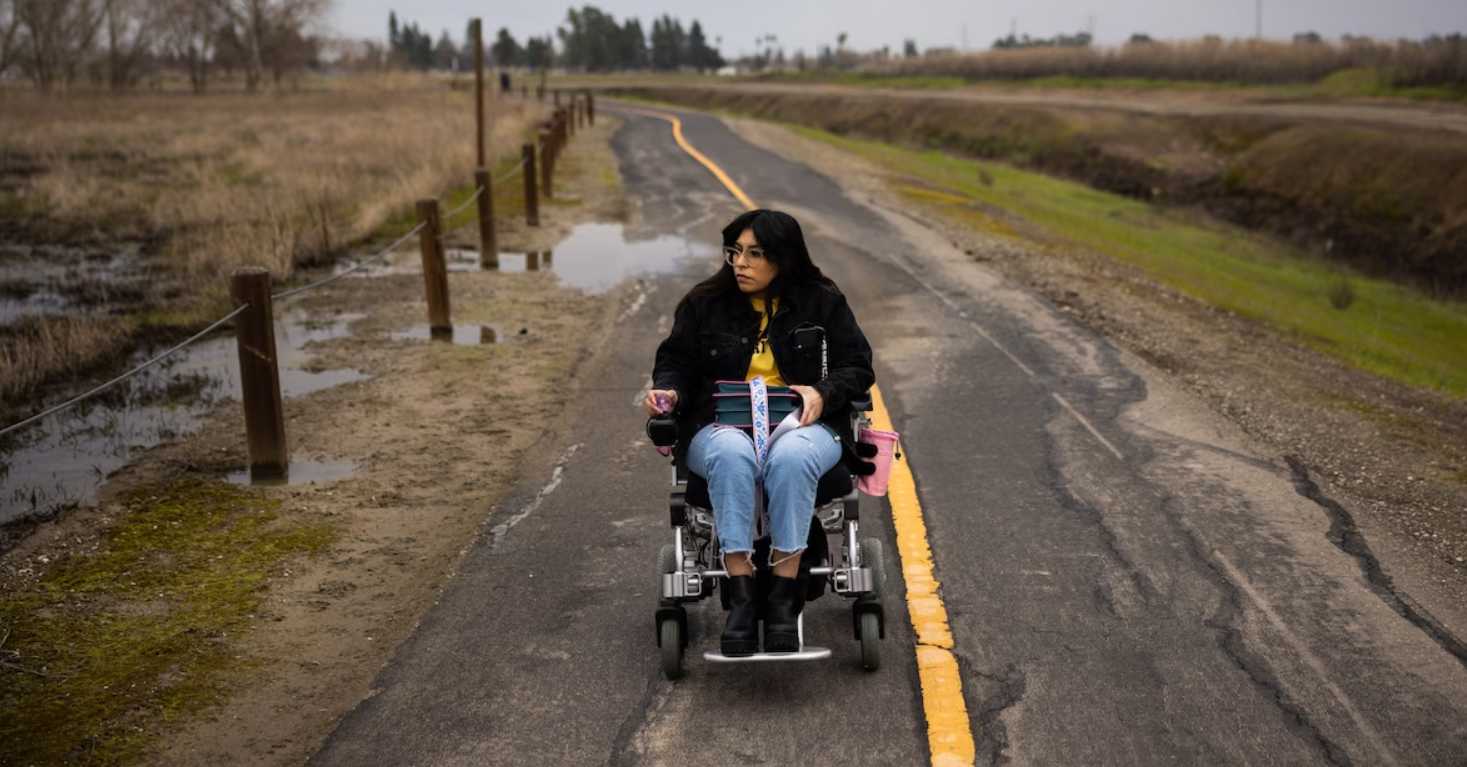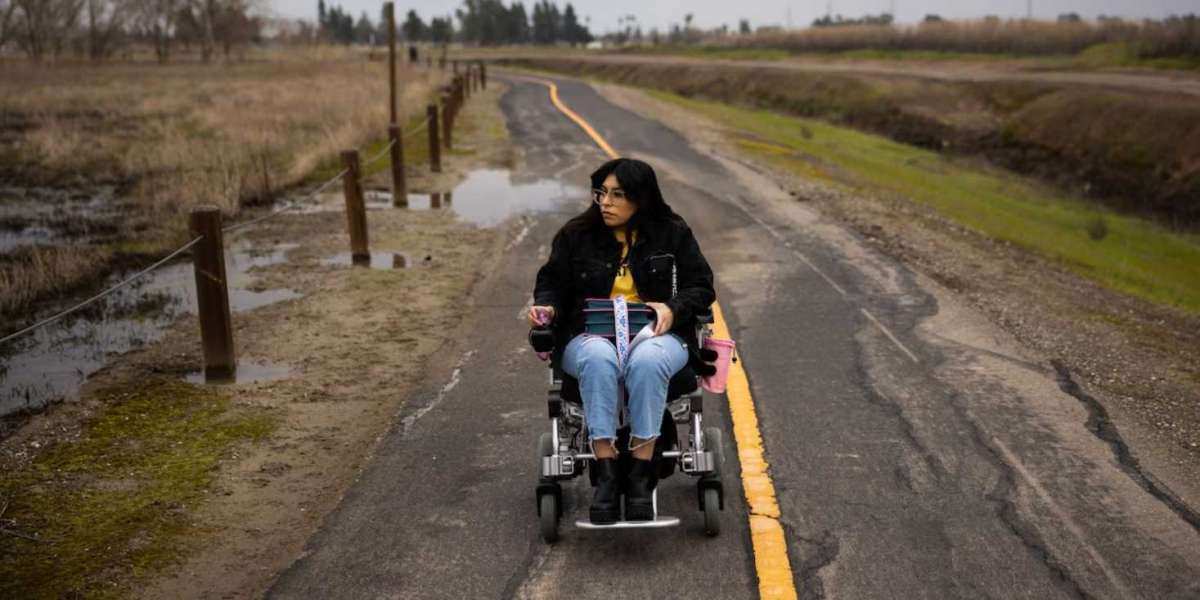
Angelica Baez uses a motorized chair to get around a park in Sacramento on Feb. 3. Baez developed postural tachycardia syndrome, called POTS, after getting covid in 2020. She quickly becomes fatigued by walking. (Max Whittaker for The Washington Post)
POTS stands for postural orthostatic tachycardia syndrome, a disorder of the autonomic nervous system, which regulates involuntary functions like heart rate, blood pressure and digestion.
“When the autonomic nervous system is not functioning properly, any or all of those things can go a little haywire,” said David R. Fries, a cardiologist and POTS specialist at Rochester Regional Health.
POTS patients typically experience a marked rise in heart rate when standing and a complex combination of symptoms, including dizziness, brain fog, fainting, headache and fatigue, among many others.
There is no known cure for POTS, but physical therapy, medications and diet changes related to salt intake can sometimes help.
Experts say there is a dire shortage of medical professionals who know how to care for patients with POTS. Lauren Stiles, president and chief executive of Dysautonomia International, a nonprofit advocacy group, estimates that the number of people with POTS has at least doubled since the start of the pandemic, while the number of specialists has remained the same and waiting lists are getting longer.
“They were overwhelmed and flooded long before covid,” Stiles said “We need to increase the amount of experts in this because it wasn’t enough before covid, and it’s certainly not enough now.”
Symptoms can vary widely, and in some cases, can be debilitating.
Angelica Baez, 25, of Sacramento, got sick with covid in March 2020. Soon after, she developed unusual symptoms, including tingling hands, frequent diarrhea and either feeling extremely cold or extremely hot. But the most debilitating symptom was that she almost constantly felt dizzy. She often felt like she might pass out and had trouble walking long distances.
“My heart started going insane. I could feel it pounding in my chest,” she recalled. “I literally felt like I was going to die.”
Just standing up or walking across the kitchen caused her heart rate to spike to 160 beats per minute, and she frequently rushed to the E.R., worried that she was having a heart attack. She tried consulting various doctors but was dismissed because nothing seemed wrong with her heart or overall health.
“I would go to the doctor, and he just started telling me, ‘No, I think you just have anxiety,’” she said. “And I was like, you know what? I have anxiety because of what’s happening to me.”
Baez was finally seen by a cardiologist who diagnosed POTS in early 2022.
“I would go to the doctor, and he just started telling me, ‘No, I think you just have anxiety,’” she said. “And I was like, you know what? I have anxiety because of what’s happening to me.”— Angelica Baez
Life has changed dramatically for Baez since developing POTS. She needs to use a wheelchair to go longer distances and a shower chair to bathe. She gets dizzy if she sits upright or stands for long periods of time. Before getting sick, she was painting and interviewing for a job as a medical secretary. She can no longer work and can only paint in short bursts.
Now, Baez is taking salt tablets and fluids and wears compression garments, which are both common interventions for POTS. She hasn’t been able to find a POTS specialist in her area. She sees a cardiologist and has been trying alternative treatments like acupuncture and herbal medicine.
Part of the problem in diagnosing and treating POTS patients is that many doctors aren’t familiar with it and patients often see multiple doctors before finally getting diagnosed. One study of more than 4,800 POTS patients found that most didn’t get diagnosed until a year or more after first seeing a doctor, and the average diagnostic delay was nearly five years.
It’s still unclear how many covid patients develop POTS. Studies show that anywhere from 2 percent to 14 percent of people with covid develop POTS. One study of long covid patients found that overall 30 percent met the criteria for POTS, although it was far more common in women. In that study, 36 percent of women met criteria for POTS compared to 7 percent of men.
Before the pandemic, Tae Chung, director of the Johns Hopkins Postural Orthostatic Tachycardia Syndrome (POTS) program, said he had an appointment wait list that was about a year long, which was on par with many other POTS clinics. Now it’s a little over two years long, he said.
Fries, the cardiologist and POTS specialist at Rochester Regional Health, said most cardiology appointments take about 40 minutes, but because of the complexity of symptoms associated with POTS, most of his appointments with POTS patients take 60 to 80 minutes. Because his caseload of POTS patients has roughly doubled since the pandemic, leading to longer wait times, Fries has started working on Saturdays.
After Jillian York, 17, of Spring, Tex., got covid in June 2022, she experienced stomach aches and excessive sweating, and began having trouble sleeping. She felt dizzy after standing up and like she might faint when she performed as a drum major in her marching band. Getting up from the sofa caused her to blackout for a few seconds.
Her mother, Heather York, 49, said she initially thought the Texas heat was to blame, but it soon became apparent that something was off.
She started taking her daughter to doctors, but felt dismissed. Doctors attributed Jillian’s symptoms to her recent weight loss, despite the fact that she remained at a healthy weight.
Jillian said doctors made her feel “minimized.” “I just felt really lost,” she said.
Finally, in November, her mother took her to a pediatric neurologist, who told Jillian that she had POTS.
Jillian has struggled to find a treatment that works. She has seen numerous cardiologists and other specialists and tried alternative interventions like acupuncture. Physical therapy has offered some relief, she said.
https://www.washingtonpost.com/wellness/2023/02/27/pots-heart-fainting-long-covid/#:~:text=%E2%80%9CThe%20lack%20of,validated%2C%E2%80%9D%20he%20said.


